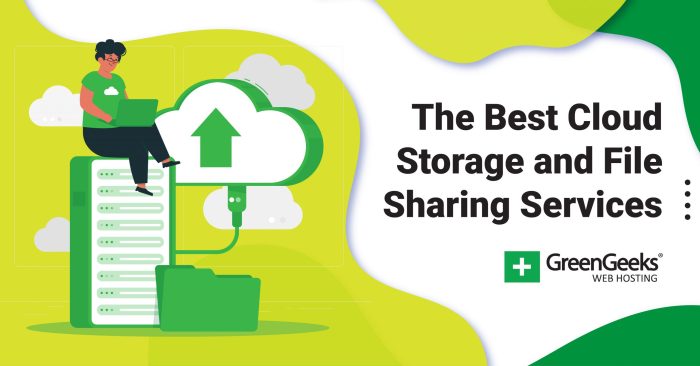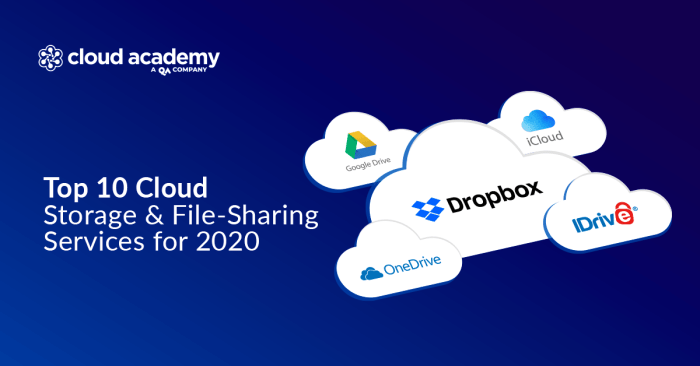The Best Cloud Storage and File-Sharing Services have become indispensable in our digital age, offering a seamless way to store, access, and share files from anywhere. These services have revolutionized how we manage our data, offering a plethora of benefits like accessibility, security, and collaboration.
However, navigating the vast landscape of cloud storage providers can be daunting. This guide delves into the essential features to consider, compares top contenders, and explores real-world applications, empowering you to choose the perfect service for your needs.
From personal backups and document sharing to business-critical operations and team collaboration, cloud storage and file-sharing services have become integral to our digital lives. Their convenience, flexibility, and affordability have made them an attractive alternative to traditional storage methods. However, with numerous options available, choosing the right service can be a challenge.
Understanding the key features, security considerations, and pricing structures is crucial to make an informed decision.
Introduction
In today’s digital age, where information is readily available and shared across borders, the need for secure and efficient ways to store and share files has become paramount. Cloud storage and file-sharing services have emerged as essential tools, revolutionizing the way we manage and access our data.
These services offer a plethora of benefits, including accessibility, scalability, and cost-effectiveness. They allow users to store their data in secure, remote servers, eliminating the need for physical storage devices and freeing up valuable space on personal computers.
Benefits of Cloud Storage and File-Sharing Services
Cloud storage and file-sharing services offer a range of advantages, making them an indispensable part of our digital lives.
- Accessibility:Users can access their files from any device with an internet connection, eliminating the need to carry physical storage devices. This provides greater flexibility and convenience, allowing users to work on their files from anywhere, anytime.
- Scalability:Cloud storage offers a flexible and scalable solution, allowing users to easily increase or decrease storage capacity based on their needs. This eliminates the need for upfront investments in expensive hardware and provides a cost-effective way to manage data growth.
- Cost-Effectiveness:Cloud storage services often provide a more affordable solution compared to traditional storage methods, especially for businesses with large data storage requirements. They eliminate the need for expensive hardware, maintenance, and power consumption, resulting in significant cost savings.
- Security:Reputable cloud storage providers employ advanced security measures, such as data encryption, access control, and regular backups, to protect user data from unauthorized access, loss, or damage. This ensures the safety and integrity of sensitive information.
- Collaboration:Cloud-based file-sharing platforms facilitate seamless collaboration among users, allowing them to share files, edit documents, and work together on projects in real-time. This fosters efficient teamwork and enhances productivity.
Challenges of Cloud Storage and File-Sharing Services
While cloud storage and file-sharing services offer numerous benefits, they also present some challenges that users should be aware of.
- Internet Connectivity:Access to cloud storage and file-sharing services is dependent on a stable internet connection. In areas with limited or unreliable internet access, these services may be less effective or even unavailable.
- Data Privacy and Security:Despite the security measures implemented by cloud providers, concerns regarding data privacy and security persist. Users need to carefully choose reputable providers with strong security protocols and policies to ensure the protection of their sensitive information.
- Data Ownership and Control:When storing data in the cloud, users relinquish some control over their data. They rely on the cloud provider for data management, backups, and security. It is important to understand the terms of service and data ownership policies of the chosen provider.
- Vendor Lock-in:Choosing a specific cloud storage provider may lead to vendor lock-in, making it difficult to switch to another provider in the future. This can create dependence on a single vendor and limit flexibility.
- Cost Considerations:While cloud storage services can be cost-effective, the cost can vary depending on the storage capacity, features, and usage patterns. It is essential to carefully evaluate the pricing plans and choose a service that aligns with your budget and needs.
Key Features and Considerations

Choosing the right cloud storage and file-sharing service is crucial for individuals and businesses alike. The ideal service should not only provide ample storage space but also offer a robust set of features to ensure data security, reliability, and ease of use.
This section delves into the key factors to consider when selecting a cloud storage and file-sharing service.
Security
Data security is paramount when choosing a cloud storage service. You need to be confident that your files are protected from unauthorized access and potential breaches.
- Encryption:The service should employ end-to-end encryption, meaning your data is encrypted both at rest and in transit. This ensures that even if the service provider’s servers are compromised, your data remains secure. For example, services like pCloud and SpiderOak use zero-knowledge encryption, where only you have the keys to decrypt your data.
- Two-factor authentication (2FA):2FA adds an extra layer of security by requiring users to provide two forms of identification, such as a password and a code generated by a mobile app, before accessing their accounts. This makes it significantly harder for unauthorized individuals to gain access to your data.
- Compliance with industry standards:Look for services that adhere to industry standards like HIPAA (Health Insurance Portability and Accountability Act) for healthcare data or GDPR (General Data Protection Regulation) for personal data. These certifications indicate that the service provider has implemented appropriate security measures to protect sensitive information.
Reliability
A reliable cloud storage service ensures that your data is accessible when you need it.
- Data redundancy:The service should offer data redundancy, meaning your files are stored on multiple servers across different locations. This minimizes the risk of data loss due to server failure or natural disasters.
- Service uptime:Look for services with a high uptime guarantee, indicating that the service is available for a significant percentage of the time. This ensures that you can access your files without interruptions.
- Data backups:The service should provide options for backing up your data to prevent permanent loss in case of accidental deletion or hardware failure.
Pricing
Cloud storage services come with varying pricing plans, so it’s important to choose one that aligns with your budget and storage needs.
- Storage capacity:Consider the amount of storage space you need. Some services offer free plans with limited storage, while others provide tiered plans with increased storage capacity at higher costs.
- Features included:Evaluate the features included in each pricing plan, such as file versioning, sharing options, and data recovery. Some services may charge extra for advanced features.
- Value for money:Compare the pricing plans of different services to find the best value for your money. Look for services that offer a good balance of features and storage capacity at a reasonable price.
User Interface, The Best Cloud Storage and File-Sharing Services
A user-friendly interface makes it easy to navigate the service, manage your files, and share them with others.
- Ease of use:The interface should be intuitive and easy to navigate, even for users who are not tech-savvy.
- File organization:The service should provide features for organizing your files into folders and subfolders. This makes it easier to find the files you need quickly.
- Search functionality:A robust search function allows you to easily locate files based on s or other criteria.
Mobile Accessibility
Mobile accessibility is crucial for accessing and managing your files on the go.
- Dedicated mobile apps:The service should have dedicated mobile apps for iOS and Android devices, allowing you to access your files from anywhere.
- Offline access:Some services offer offline access to files, allowing you to access them even when you’re not connected to the internet.
- Mobile-friendly interface:The mobile app should be easy to use and have a user-friendly interface that is optimized for smaller screens.
Top Cloud Storage and File-Sharing Services

Choosing the right cloud storage and file-sharing service can be a daunting task, given the vast array of options available. Understanding the specific needs and requirements for your data storage and sharing needs is crucial to selecting the most suitable service.
This section provides a detailed comparison of some of the most popular and highly-regarded cloud storage and file-sharing services, helping you make an informed decision.
Comparison of Cloud Storage and File-Sharing Services
This table provides a comprehensive comparison of prominent cloud storage and file-sharing services, highlighting key features, pricing plans, and storage capacity.
| Service Name | Pricing Plans | Storage Capacity | Security Features | File Sharing Capabilities | Other Features |
|---|---|---|---|---|---|
| Google Drive | Free (15GB), Google One (100GB
| 15GB
| Two-factor authentication, file encryption, version history | File sharing with links, permissions control, collaborative editing | Integration with Google Workspace, offline access, Google Photos integration |
| Dropbox | Free (2GB), Plus (2TB), Professional (3TB), Family (2TB) | 2GB
| Password protection, file encryption, two-factor authentication | File sharing with links, password protection, folder sharing | Version history, file recovery, Dropbox Paper for collaboration |
| Microsoft OneDrive | Free (5GB), Personal (100GB Discover how What is a Cloud Service Provider has transformed methods in this topic.
| 5GB
| File encryption, two-factor authentication, version history | File sharing with links, permissions control, collaborative editing | Integration with Microsoft Office apps, offline access, file syncing |
| pCloud | Free (10GB), Premium (500GB
| 10GB
| Zero-knowledge encryption, two-factor authentication, version history | File sharing with links, password protection, folder sharing | Lifetime storage plans, file recovery, folder syncing |
Service Overviews
Each service offers unique strengths and weaknesses, catering to different user needs.
Google Drive
Google Drive excels in its seamless integration with Google Workspace, providing a unified platform for document creation, editing, and collaboration. Its free plan offers 15GB of storage, sufficient for basic needs, while paid plans offer more generous storage options. The platform’s strong security features, including two-factor authentication and file encryption, ensure data protection.
Dropbox
Dropbox is renowned for its user-friendly interface and reliable file syncing capabilities. Its free plan offers 2GB of storage, while paid plans provide significantly more space. Dropbox’s focus on collaboration is evident in its features like Dropbox Paper, which facilitates team communication and document co-creation.
Microsoft OneDrive
Microsoft OneDrive is deeply integrated with Microsoft Office apps, making it an ideal choice for users who heavily rely on these tools. Its free plan offers 5GB of storage, while paid plans offer increased capacity. OneDrive’s security features, including file encryption and two-factor authentication, ensure data security.
pCloud
pCloud stands out with its lifetime storage plans, offering a compelling option for users seeking long-term data storage. The service provides robust security features, including zero-knowledge encryption, ensuring data privacy. pCloud’s file sharing capabilities are comprehensive, allowing users to share files with links, passwords, and folder sharing options.
Use Cases and Applications
Cloud storage and file-sharing services have become indispensable tools across various sectors, offering individuals, businesses, and organizations a range of benefits, from convenient data storage and access to enhanced collaboration and data security.
Individual Use Cases
Individuals leverage cloud storage and file-sharing services for various personal needs, including:
- Photo and Video Storage:Cloud storage services like Google Photos, Dropbox, and iCloud provide ample space to store and share personal photos and videos, ensuring easy access across multiple devices and preventing data loss due to device failure.
- Document Backup and Synchronization:Cloud services enable users to back up important documents, such as financial records, tax information, and personal files, ensuring data recovery in case of device loss or damage. Services like OneDrive and Google Drive allow users to synchronize files across multiple devices, ensuring consistency and accessibility.
- File Sharing and Collaboration:Cloud-based file-sharing platforms facilitate easy file sharing with family, friends, and colleagues. Users can share photos, documents, and other files through email, links, or dedicated sharing features, simplifying communication and collaboration.
Business Use Cases
Businesses rely on cloud storage and file-sharing services for various operations, including:
- Data Storage and Management:Cloud storage solutions provide businesses with a scalable and secure way to store large volumes of data, such as customer information, financial records, and product designs. Services like Amazon S3 and Azure Blob Storage offer high availability and data redundancy, ensuring business continuity.
- Team Collaboration and Communication:Cloud-based file-sharing platforms like Google Drive, Dropbox, and Microsoft Teams enable teams to collaborate on documents, spreadsheets, and presentations in real time, facilitating seamless communication and project management.
- Remote Work and Access:Cloud storage and file-sharing services empower employees to access and work on files from any location with an internet connection, enabling remote work and improving productivity.
- Data Backup and Disaster Recovery:Cloud storage solutions offer robust data backup and disaster recovery capabilities, ensuring business continuity in case of hardware failure, natural disasters, or other unforeseen events. Businesses can leverage cloud storage to store backups and replicate data across multiple locations, minimizing downtime and data loss.
Organizational Use Cases
Organizations across various sectors utilize cloud storage and file-sharing services to address specific needs, including:
- Healthcare:Hospitals and clinics use cloud storage to securely store patient records, medical images, and other sensitive data, ensuring compliance with privacy regulations. Cloud-based file-sharing platforms facilitate collaboration among medical professionals, enabling efficient patient care and data exchange.
- Education:Educational institutions leverage cloud storage for online learning platforms, student data management, and document sharing. Cloud-based file-sharing services enable teachers to share lesson plans, assignments, and other resources with students, promoting collaboration and remote learning.
- Finance:Financial institutions utilize cloud storage to manage large volumes of financial data, including customer transactions, investment records, and regulatory reports. Cloud-based file-sharing platforms facilitate secure data exchange between financial institutions and their clients, ensuring efficient and secure transactions.
- Government:Government agencies utilize cloud storage to manage citizen records, public data, and sensitive information. Cloud-based file-sharing services enable secure collaboration among government departments and agencies, facilitating efficient information sharing and decision-making.
Future Trends and Innovations

The realm of cloud storage and file-sharing is constantly evolving, driven by technological advancements and the growing demand for seamless data management and collaboration. As we move forward, several emerging trends and innovations are poised to reshape the landscape of how we store, share, and access our digital assets.
Enhanced Security Measures
The increasing reliance on cloud services necessitates robust security measures to safeguard sensitive data. Advancements in encryption technologies, such as homomorphic encryption, enable computations on encrypted data without decrypting it, enhancing privacy and security. Multi-factor authentication, granular access controls, and advanced threat detection systems are becoming increasingly sophisticated, bolstering protection against unauthorized access and cyberattacks.
Advanced Collaboration Tools
Cloud storage and file-sharing platforms are continuously integrating more collaborative features. Real-time co-editing tools allow multiple users to work on documents simultaneously, fostering efficient teamwork and reducing version conflicts. Integration with project management tools, communication platforms, and video conferencing services enhances collaboration workflows, enabling teams to work seamlessly across geographical boundaries.
Artificial Intelligence Integration
Artificial intelligence (AI) is transforming various aspects of cloud storage and file-sharing. AI-powered search capabilities can analyze and understand the content of files, facilitating more efficient and accurate retrieval. AI-driven automation can streamline tasks such as file organization, tagging, and backup scheduling, freeing up users’ time and resources.
Additionally, AI can be used to identify and prevent data breaches, improving overall security posture.
Edge Computing and Decentralized Storage
Edge computing, which brings data processing and storage closer to users, is gaining traction. This approach reduces latency and improves performance, especially for applications requiring real-time data access. Decentralized storage technologies, such as blockchain and distributed ledger technologies, are emerging as alternatives to centralized cloud storage, offering increased security, resilience, and data ownership.
Increased Adoption of Cloud-Native Applications
Cloud-native applications are designed specifically for the cloud environment, leveraging its scalability, flexibility, and cost-effectiveness. The increasing adoption of these applications will further drive the demand for robust cloud storage and file-sharing solutions, as they require reliable and scalable data management capabilities.
Personalized Data Management
As the volume of data continues to grow, personalized data management solutions are becoming increasingly important. Users expect tailored experiences that allow them to organize, categorize, and access their data in a way that best suits their needs. AI-powered tools can analyze user behavior and preferences to provide personalized recommendations and insights, enhancing data accessibility and usability.
Last Point
In conclusion, cloud storage and file-sharing services have transformed how we manage and access our data. Whether you are an individual looking for secure backups or a business seeking collaborative tools, there is a service tailored to your needs. By carefully evaluating features, pricing, and security measures, you can select the best platform to streamline your digital workflow and enhance productivity.
As technology continues to evolve, we can expect even more innovative solutions that further simplify our digital lives.
FAQ Corner: The Best Cloud Storage And File-Sharing Services
What are the security risks associated with cloud storage?
While cloud storage offers robust security measures, it’s essential to be aware of potential risks. Data breaches, unauthorized access, and data loss are possibilities. Choosing a reputable provider with strong encryption and multi-factor authentication is crucial. Additionally, users should adopt best practices like using strong passwords and enabling two-factor authentication to minimize risks.
How do I choose the right cloud storage service for my business?
Selecting the right cloud storage service for your business requires considering factors like data storage needs, collaboration requirements, security protocols, and budget. Look for services with robust security features, reliable uptime, and user-friendly interfaces. Additionally, consider features like version control, file sharing permissions, and integrations with existing business applications.
Are there any free cloud storage options available?
Yes, several cloud storage providers offer free tiers with limited storage capacity. These options are ideal for individuals who need basic storage and file sharing capabilities. However, free tiers often come with restrictions on storage space, file size, and other features.
For more demanding needs, consider paid plans that offer increased storage capacity and advanced features.